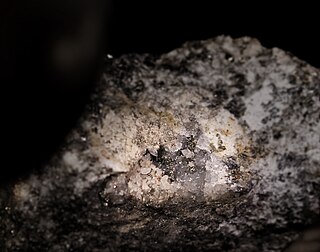
The mineral petzite, Ag3AuTe2, is a soft, steel-gray telluride mineral generally deposited by hydrothermal activity. It forms isometric crystals, and is usually associated with rare tellurium and gold minerals, often with silver, mercury, and copper.

Calaverite, or gold telluride, is an uncommon telluride of gold, a metallic mineral with the chemical formula AuTe2, with approximately 3% of the gold replaced by silver. It was first discovered in Calaveras County, California in 1861, and was named for the county in 1868.

Sylvanite or silver gold telluride, chemical formula (Ag,Au)Te2, is the most common telluride of gold.

Altaite, or lead telluride, is a yellowish white mineral with an isometric crystal structure. Altaite is in the galena group of minerals as it shares many of properties of galena. Altaite has an unusually high density for a light-colored mineral. Altaite and other rare tellurides are classified in the sulfide mineral class.
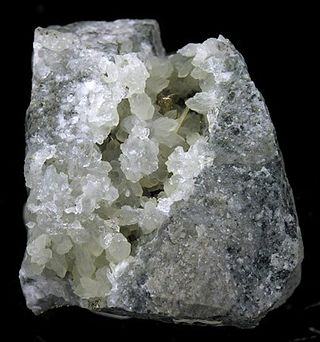
Krennerite is an orthorhombic gold telluride mineral which can contain variable amounts of silver in the structure. The formula is AuTe2, but specimen with gold substituted by up to 24% with silver have been found ([Au0.77Ag0.24]Te2). Both of the chemically similar gold-silver tellurides, calaverite and sylvanite, are in the monoclinic crystal system, whereas krennerite is orthorhombic.

Rickardite is a telluride mineral, a copper telluride (Cu7Te5) or Cu3-x (x = 0 to 0.36)Te2. It was first described for an occurrence in the Good Hope Mine, Vulcan district, Gunnison County, Colorado, US, and named for mining engineer Thomas Arthur Rickard (1864–1953). It is a low temperature hydrothermal mineral that occurs associated with vulcanite, native tellurium, cameronite, petzite, sylvanite, berthierite, pyrite, arsenopyrite and bornite.
Weissite is a telluride mineral, a copper telluride. Its chemical formula is Cu
2−xTe. Weissite has hexagonal crystal structure. Its specific gravity is 6 and its Mohs hardness is 3. Occurrence is in Gunnison County, Colorado, Arizona and New Mexico in the United States. It is also reported from Kalgoorlie, Western Australia and Dalarna and Värmland, Sweden.

Melonite is a telluride of nickel; it is a metallic mineral. Its chemical formula is NiTe2. It is opaque and white to reddish-white in color, oxidizing in air to a brown tarnish.
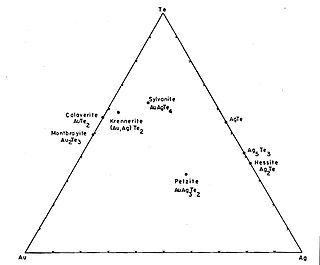
A telluride mineral is a mineral that has the telluride anion as a main component.

Tellurobismuthite, or tellurbismuth, is a telluride mineral: bismuth telluride (Bi2Te3). It crystallizes in the trigonal system. There are natural cleavage planes in the (0001) direction as the crystal is effectively lamellar (layered) in that plane. The Mohs hardness is 1.5 – 2 and the specific gravity is 7.815. It is a dull grey color, which exhibits a splendent luster on fresh cleavage planes.

Silver telluride (Ag2Te) is a chemical compound, a telluride of silver, also known as disilver telluride or silver(I) telluride. It forms a monoclinic crystal. In a wider sense, silver telluride can be used to denote AgTe (silver(II) telluride, a metastable compound) or Ag5Te3.

Empressite or tellursilberblende is a mineral form of silver telluride, AgTe. It is a rare, grey, orthorhombic mineral with which can form compact masses, rarely as bipyramidal crystals.
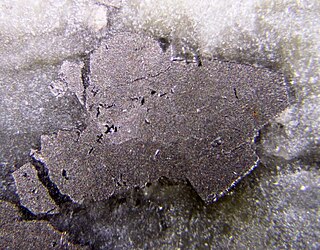
Temagamite is a bright white palladium mercury telluride mineral with a hardness of 2+1⁄2 on the Mohs scale. Its chemical formula is Pd3HgTe3. It was discovered at the Temagami Mine on Temagami Island, Lake Temagami in 1973, and it represents a rare mineral in the Temagami Greenstone Belt.
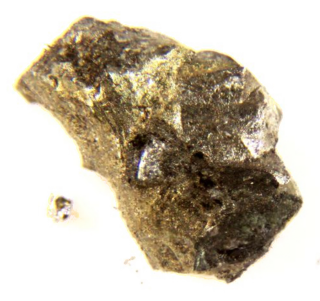
Vulcanite is a rare copper telluride mineral. The mineral has a metallic luster, and has a green or bronze-yellow tint. It has a hardness between 1 and 2 on the Mohs scale. Its crystal structure is orthorhombic.

Coloradoite, also known as mercury telluride (HgTe), is a rare telluride ore associated with metallic deposit. Gold usually occurs within tellurides, such as coloradoite, as a high-finess native metal.

Stützite or stuetzite is a silver telluride mineral with formula: Ag5−xTe3 (with x = 0.24 to 0.36) or Ag7Te4.

Teineite is a tellurite mineral with the formula Cu(TeO3). 2 H2O. It has a Mohs hardness of 2.5 and it comes in many different shades of blue, ranging from cerulean blue to bluish-gray. The mineral millsite has the same chemical composition, but crystallizes in the monoclinic system, while teineite crystallizes in the orthorhombic system.
Bilibinskite is an Au – Cu – Pb telluride. It is a rare mineral that was named after Soviet geologist Yuri Bilibin (1901–1952), who researched the geology of gold deposits during the time of the USSR.
Telluro-silver glance — is a trivial name given by collectors and mineral dealers, miners, geologists and other professions to at least two ore mineralsrare ore minerals, tellurides of silver. It may refer to:
Telluric silver — is an obsolete trivial name, which collectors and mineral traders, miners, geologists and representatives of other applied professions actually applied to several rare ore minerals, tellurides of silver, as well as to chemical compounds of similar composition. It may refer to:
















